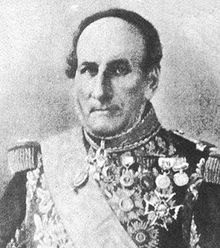Léonard Charner
Léonard Victor Joseph Charner | |
|---|---|
 Léonard Victor Joseph Charner | |
| Representative of Côtes-du-Nord | |
| In office 13 May 1849 – 2 December 1851 | |
| Governor of Cochinchina | |
| In office 6 February 1861 – 30 November 1861 | |
| Preceded by | Joseph Hyacinthe Louis Jules d'Ariès |
| Succeeded by | Louis Adolphe Bonard |
| Senator | |
| In office 22 February 1862 – 6 February 1869 | |
| Personal details | |
| Born | 13 February 1797 Cochinchina Campaign |
Léonard Victor Joseph Charner (13 February 1797 – 7 February 1869) was an Admiral of the French Navy. As a commander of French naval forces in Asia from May 1860 to September 1861, including the Second Opium War and the Cochinchina campaign, he was a significant participant in the establishment of French Indochina.
Early career (1797–1837)
Léonard Victor Joseph Charner was born on 13 February 1797 in
Captain (1837–48)
Charner became a
French Second Republic (1848–51)
During the
Second French Empire (1852–69)
After the
In May 1860 Charner took command of the naval fores in the China seas and supported the expeditionary force during the Second Opium War. After directing the disembarkation of the troops at Peïo he directed his gunboats to attack the forts that defended the entrance to the river. He was then appointed commander in chief of the land and sea forces in Cochinchina.[2]
As soon as the war ended, Charner left for
Charner was replaced by Admiral
Later career
Charner returned to France in September 1861, and on 22 January 1862 was made a senator. Until his death he sat with the supporters of the imperial regime. He was promoted to admiral by decree of 15 November 1864. He was awarded the Grand Cross of the Legion of Honour on 10 February 1861.
References
- ^ a b c Tucker 2011, p. 189.
- ^ a b c d e f g h Robert & Cougny 1889–1891.
- ^ Chapuis 2000, p. 5.
- ^ Hall 1966, p. 560.
- ^ Appletons' annual cyclopaedia 1863, p. 224.
- ^ Buttinger 1968, p. 86.
- ^ Tarling 2004, p. 220.
- ^ Randier 2006, p. 448.
- ^ a b Borer 1999, p. 23.
Sources
- Appletons' annual cyclopaedia and register of important events of the year: 1862, New York: D. Appleton & Company, 1863
- Borer, Douglas A. (1999), Superpowers Defeated: Vietnam and Afghanistan Compared, Taylor & Francis, ISBN 978-0-7146-4409-7, retrieved 2018-07-23
- Buttinger, Joseph (June 1968), Vietnam; a Political History, International Thomson Publishing, ISBN 0275177904
- Chapuis, Oscar (2000), The Last Emperors of Vietnam: From Tu Duc to Bao Dai, Greenwood Publishing Group, ISBN 978-0-313-31170-3, retrieved 2018-07-23
- CHARNER Léonard-Victor-Joseph (in French), Sénat de France, retrieved 2018-07-23
- Hall, Daniel George Edward (1966), A history of South-east Asia,
The China war ended in January 1861, and at once Admiral Charner, with a strong naval squadron and 3000 troops, left for Saigon
- Randier, D. J. M. (2006), The Making of Modern South-East Asia: economic and social change, Editions Babouji, ISBN 2-35261-022-2,
Charner relieved the Saigon garrison after a three-week struggle which culminated in the battle of Chi Hoa
[1] - Robert, Adolphe; Cougny, Gaston (1889–1891), "Charner, Léonard Victor Joseph", in Edgar Bourloton (ed.), Dictionnaire des Parlementaires français (1789–1889) (in French), retrieved 2018-07-23
- Tarling, Nicholas (2004), Imperialism in Southeast Asia, Taylor & Francis, ISBN 0203402553
- Tucker, Spencer C. (2011-05-20), The Encyclopedia of the Vietnam War: A Political, Social, and Military History, 2nd Edition [4 volumes]: A Political, Social, and Military History, ABC-CLIO, ISBN 978-1-85109-961-0, retrieved 2018-07-23
- ^ Randier 2006, p. 380.
